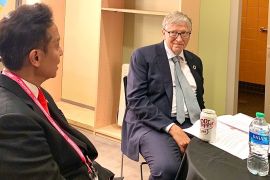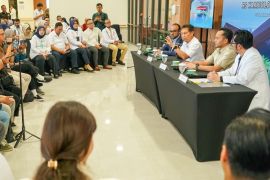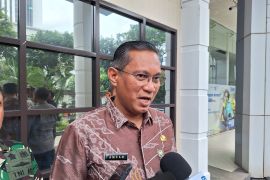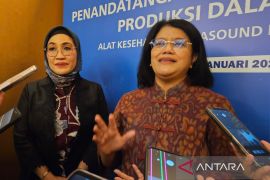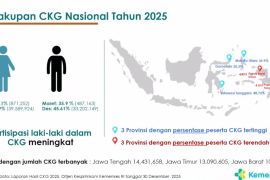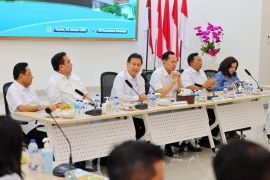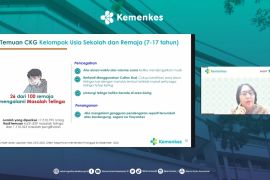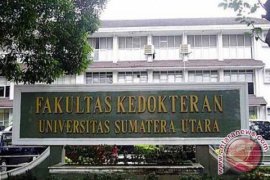The draft of the bill, initiated by the House, that had been approved by eight factions, except the Prosperous Justice Party (PKS), is related to factual issues in today's society, especially in the health sector.
In a public discussion agenda entitled "The Urgency of the Health Bill" that the National Awakening Party (PKB) held on February 18, the Health Ministry's Secretary General Kunta Wibawa Dasanugraha had highlighted the importance of having regulations that are able to answer challenges in the health transformation system in Indonesia.
Of the six pillars of the Health Ministry's health transformation, Dasanugraha highlighted several important issues that required strengthening of the legal framework, including increasing the quality and distribution of doctors in Indonesia.
The shortage of specialist doctors in Indonesia is related to distribution which is too concentrated in Java Island, especially in Jakarta. Apart from the distribution issue, the shortage of specialist doctors in Indonesia is also related to inadequate educational institutions.
According to the Indonesian Medical Council's (KKI's) data, as of December 6, 2022, the number of specialist doctors in Java had reached 34,763 people. It means, there are approximately 22 medical specialists for every 100,000 residents in Java.
Meanwhile, there are only 615 specialist doctors in Maluku and Papua or around seven specialist doctors for every 100,000 residents in eastern Indonesia.
The digital footprint also records dozens of tuberculosis (TB) patients lining up at the Sidikalang Hospital in North Sumatra. One obstetrician specialist was also dismissed from the Sidikalang Hospital for negligence in a baby that caused to the baby’s death.
The management of the Sidikalang Hospital admits that they only have two obstetricians. The hospital often refuses patients with complaints of ear, nose, and throat pain because they do not have an otorhinolaryngologist.
The Karangasem General Hospital in Bali also experiences the same situation. It has been facing a shortage of cardiologists, radiologists, general practitioners, and internists over the past few years.
Head of the Karangasem Public Hospital's Service Department I Komang Wirya said there is only one cardiologist available who should serve around 10-15 patients per day.
In Aceh, Rahmat Aulia, a sixth-grader from Pidie Jaya, must take his father by a motorized pedicab once in every 10 days to a hospital in North Aceh District, about 160 kilometers away from his home, due to the lack of health facilities.
Shortage of specialist doctors
The Health Ministry reports that Indonesia still lacks around 3,941 Obstetrics and Gynecology doctors. Unfortunately, around 300 pregnant women die from 100,000 live births in the country. In addition, neonatal infants aged 0-28 days, are reported to die for every 1,000 births. This figure is far above other countries, including Singapore, Malaysia, Thailand, and Vietnam.
The current system of Medical Specialist Education Program (PPDS) in Indonesia still requires an average of 36 years to produce the needs of obstetricians in Indonesia.
Specialist doctors seem to be a rare item in Indonesia. The biggest shortage of specialist doctors was experienced by obstetricians with 3,941 doctors, 3,662 pediatricians, and 2,581 internists.
With the current number of lecturers and student quotas per lecturer, medical schools in Indonesia are estimated to need 1.36 years to meet the needs of obstetricians, 2.26 years for pediatricians, and 3.23 years for internists.
The PPDS entrance fees as well as expensive college tuition fees (for 10 semesters) and "illegal levies" or locally called "biaya siluman" that prospective students need to pay may have contributed to the limited number of specialist doctors in Indonesia.
The medical students are also facing other challenges, such as paying costs for participating in workshops and training outside the city, daily living expenses for themselves and families, as well as "unofficial costs" when meeting with seniors who want them to buy food, office needs, and medicines.
Apart from the limited PPDS quota and the "bullying system", the "biaya siluman" may become the reason why Indonesia is still lacking specialist doctors. There has been a lack of transparency at universities regarding the costs that are suspected to be illegal.
On the other hand, doctors who are pursuing specialist or residency do not receive a salary reward, even though they work for 48 hours per week without taking a rest.
However, the salary system for resident doctors is mandated in Law Number 20/2013 concerning Medical Education. Article 31, paragraph b, stipulates that every student has the right to receive incentives at Teaching Hospitals and Medical Education Facilities.
This provision applies to students of primary care doctor programs, specialist and sub-specialist doctors, as well as specialists and sub-specialist dentists.
What is regulated in these provisions is also applied in other countries. The average salary for resident doctors in the United States, for example, can be up to Rp900 million per year or around US$58 thousand. In Australia, the salary could reach Rp1.2 billion or US$78 thousand per year, and Rp121 million or US$8 thousand per year in India.
Acceleration
Health Minister Budi Gunadi Sadikin stated that the concept of hospital-based specialist education is a new system to increase the number and distribution of specialist doctors in all districts/cities in Indonesia.
The addition of the capacity of the medical faculty according to the government's plan is estimated to cut the time needed to meet the need for specialist doctors to six to eight years.
The concept is carried out through the assistance of senior doctors at the hospital and a salary system for general practitioners who participate in the specialist program.
However, Dean of the University of Indonesia’s Faculty of Medicine Professor Ari Fahrial said the program has the potential to reduce the quality of specialist medical graduates due to the absence of a curriculum and role of professors in fulfilling competencies.
According to him, medical education and medical practice cannot be combined through the provisions of the Healthcare Omnibus Bill owing to the fact that both of them are still dealing by problems that have not been completely resolved.
The rapid development of medical science in Indonesia has not been equipped with equal infrastructure and educational resources in Indonesia. For example, many medical schools do not have biomedical science lecturers. Therefore, scholarships are needed for prospective teaching staff.
Meanwhile, some of the problems in medical practice are included in the challenges of using telemedicine and artificial intelligence (AI) innovations in the health sector, bringing foreign doctors to Indonesia, and accelerate doctors' graduation.
Based on Fahrial's experience in formulating the Health Law 10 years ago, the issue of the current bill being deliberated is not much different. The current crisis of specialist doctors is actually the result of stakeholders' collective failure to comply with the mandate of Law Number 20/2013.
Meanwhile, Chairperson of the Executive Board of the Indonesian Medical Association (PB-IDI) Adib Khumaidi has pushed for data alignment on the number of medical professions in Indonesia.
According to the IDI version, the number of doctors and specialists is recorded at around 204,492 people, while the KKI version shows a different figure, namely 214,878 people. This number also differs from the figure the Health Ministry's report reveals: 145,913 people.
He said he is worried about a possibility that the acceleration of the production of doctors in Indonesia will trigger an increase in the number of the unemployed professionals in Indonesia.
Referring to the IDI and KKI data in which the number of specialist doctors is recorded at around 44,753 people, there will be a need for additional specialists doctors of around 67 thousand people to meet the WHO ratio of 1:1,000 in Indonesia.
Apart from the pros and cons related to the Healthcare Omnibus Bill currently being deliberated by the lawmakers and government, the availability of specialist doctors is a goodwill from the state to meet its citizens' rights to get access to equitable health services.
In this regard, those involving in deliberating the bill need to prioritize the principles of collaboration of all stakeholders to enable all members of communities throughout Indonesia to receive improved quality of healthcare services.
Related news: Indonesia needs thousands of specialist doctors: Health Minister
Related news: More specialist doctors proof of healthcare transformation: Minister
Editor: Rahmad Nasution
Copyright © ANTARA 2023


